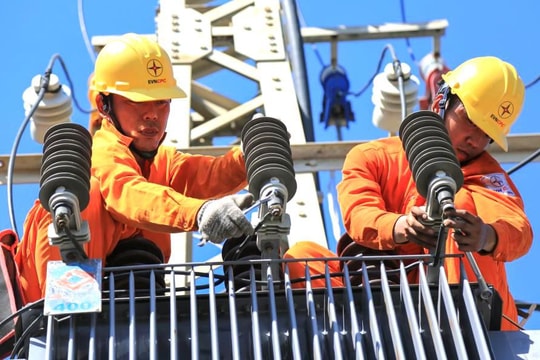Covid-19 could change the US government
History shows that crises often lead to lasting changes in the role of the US government. Covid-19 may be no exception.
The crisis is not only a public health emergency that requires a broad response, but also the worst economic damage since the Great Depression of 1929, when the US government had to spend trillions of dollars to save the economy.
Much of the US government’s operations will be curtailed for a long time because of Covid-19, but politicians across the political spectrum say there is little reason to expect a return to the status quo in government spending, or the proper role of government.
The Great Depression led to a larger social safety net and a host of new government programs. World War II led to the creation of the U.S. Department of Defense, and the Cold War created the interstate highway system. Just two decades ago, the terrorist attacks of September 11 led to the creation of new unified agencies to handle national security and international intelligence. The global financial crisis of 2008 spurred a series of new actions by the Federal Reserve that are still being replicated and expanded.

People line up for new jobs in Cleveland, Ohio, 1930. Photo: AP.
Now, both the Democratic and Republican parties and the majority of American voters are acting together decisively and widely at the state and federal levels, accepting losses in the context of a federal budget deficit expected to reach the milestone of 1,000 billion USD per year.
President Trump, who is more populist than traditional conservative, has enthusiastically supported the spending, demanding the construction of field hospitals, using his executive authority to require companies to increase production of medical supplies and offering an expansive definition of presidential power, including the power to eliminate regulations and bureaucracy in some cases.
In a recent Wall Street Journal/NBC News poll, a majority of voters in both parties said they support expanding the government’s role in the economy to deal with the Covid-19 crisis.
“One lesson we can and should learn from all of this is that you can’t just flip a switch and have a strong and effective government when you need it. Just like you can’t dismantle the Department of Defense in peacetime and then restore it in the event of an invasion. You can’t make the government as small as possible in normal times and expect it to be ready to respond well to an emergency,” said Oren Cass, head of American Compass, an organization that reviews conservative views on economic policy.
While there is a consensus on how the government should respond to the crisis, there are many who believe things have gone too far, especially at the federal level. There have been recent protests that state leaders, especially governors, have overstepped their authority by shutting down the economy and threatening American jobs and livelihoods.
“We had a discussion about whether we were going to be a capitalist or a socialist country,” said Jenny Beth Martin, co-founder of the Tea Party Patriots, an organization formed amid outrage over government bailouts during the 2008 financial crisis.
"When you passCovid-19"We will have the same discussion but in a new way," she said. Martin and many believe that in recent weeks, the government has overreacted, possibly hurting many Americans.
Scott Reed, senior political strategist at the US Chamber of Commerce, is skeptical that Republicans will continue to dominate government the way they do now. “The size of government will make Washington more relevant to the business community,” Reed said. “But in the long run, I think Republicans will be a little less involved.”
Government spending increases during crises and tends not to fall back to its previous level, at least for a while. Economists call this trend the “ratchet effect,” a Keynesian theory that, once prices have risen in response to an increase in aggregate demand, they do not always reverse when that demand falls. While many still debate its extent, statistics show that US government spending has never fallen back to pre-9/11 levels.
The ratchet effect could become more pronounced after the Covid-19 crisis, because of the many issues associated with crisis spending: an aging population that needs more social benefits, infrastructure that needs upgrading, and the cost of servicing large federal debt.

Protesters protest stay-at-home orders in Olympia, Washington, this month. Photo: AP.
It is too early to predict exactly how the size and structure of the US government will be affected in the long term by the Covid-19 pandemic. But perhaps the most obvious impact is a shift in public attitudes toward government agencies, which have not been very favorable in recent decades.
Tom Vilsack, the former Democratic governor of Iowa and the longest-serving secretary in former President Obama's cabinet, said he hoped the things he had heard over the past 40 years about government as unimportant and even problematic would fade.
"This extraordinary situation shows the importance of government at all levels and the need for all ministries and sectors to coordinate better," he said.
Conversely, the crisis has also given new impetus to calls for a unified, state-run health system. Senator Bernie Sanders has argued that “the pandemic has highlighted the shortcomings of our current, privately run health system.”
Many doubt that the crisis will lead to anything as dramatic as Medicare for All, the progressive proposal that was heavily mentioned in the Democratic primaries.
"Clearly, this debate continues within the party. I don't think it will affect the views of swing voters," said Jim Messina, a Democratic strategist who worked on former President Obama's 2012 campaign.
On the Republican side, the response of big government, or the government expanding its powers and interfering in every area of citizens' lives, in the current crisis is in complete contrast to the views of the late President Ronald Reagan, in his 1981 inaugural address.
"In the present crisis, government is not the solution to our problem; it is the problem," Reagan declared as the shadow of the previous economic recession hung over America.
Many Republicans argue that the current economic crisis is fundamentally different, because it was caused by government orders to close businesses and public places to contain Covid-19, meaning costly and drastic government action is justified to fix the problems that have arisen.
Christopher DeMuth, a fellow at the influential conservative think tank Hudson Institute in Washington, said that by removing regulatory barriers for private companies to respond to Covid-19, President Trump has effectively introduced a deregulatory and conservative shift in government operations.
Sharing the same view, Sara Fagen, political director for former President George W. Bush, said that in responding to the health crisis, "the government was too slow and sluggish, but companies were more agile, so there was a debate about free enterprise."
In addition, many Republicans are ready to embrace the $2 trillion economic rescue package, a key part of which is the Paycheck Protection Program (PPP) for small businesses. Republicans see small businesses as an economic force that aligns with their political philosophy more than the big banks, which benefited from the 2008 bailout.
"Why are Republicans so willing to defend PPP? It's because it benefits their constituency, which is small businesses. Their view of modern society is not one dominated by large corporations, but one that provides opportunities for small entrepreneurs to grow and succeed," said Karl Rove, a political strategist for former President Bush.
As the US emerges from the Covid-19 crisis, a debate will arise about whether government operations will be renewed at any level, state or federal.
Traditionally, Republicans have tended to favor a federalist approach, which seeks to decentralize government power to governors and states.
President Trump this month declared that as president, he has “total authority” to decide when governors should ease social restrictions and reopen their economies. The statement flies in the face of traditional conservative thinking. It also stands in stark contrast to President Reagan’s frequent use of the 10th Amendment, which grants powers to the states, not the federal government.
Long before the crisis, President Trump had moved the Republican Party away from its traditional Reagan-era conservative views and toward a more populist view of the role of government. A populist philosophy that is unafraid to use government power or government money to benefit working-class Americans.
So, in the midst of the crisis, the Trump administration announced that the federal government would pay the Covid-19-related medical bills of any uninsured American, and pay health care providers at Medicare rates for seniors, a move that appeared to give the green light to the Medicare for All system, which Democrats support.
Trump also announced his support for low-interest loans to finance a new $2 trillion bill to rebuild and improve the nation’s infrastructure. Even before the crisis, Trump was pushing for a national effort to deploy 5G networks, a move seen as appropriate as much of society is shifting to online learning and work.

President Donald Trump at a press conference at the White House on April 23. Photo: NYTimes.
Steve Bannon, a former close adviser to Trump, argued that voters would see a strong central government as necessary as the US enters a long-term confrontation with China. A prolonged period of tension would “change the center of gravity of government.”
In the long term, the impact of the Covid-19 pandemic may depend on how quickly the economy reopens. Voters will likely favor a more competent government at all levels, one that builds up good reserves in case of a national crisis and responds quickly and effectively when hit.
“More authoritative and calm leaders would probably be more appropriate,” said J. Ann Selzer, a nonpartisan.




.jpg)
![[Infographics] 5 biện pháp phòng, chống dịch COVID-19 [Infographics] 5 biện pháp phòng, chống dịch COVID-19](https://bna.1cdn.vn/thumbs/540x360/2025/05/22/anh-2.jpg)

-5b8619d675cc4f38cedd8c853332ddab.jpg)
